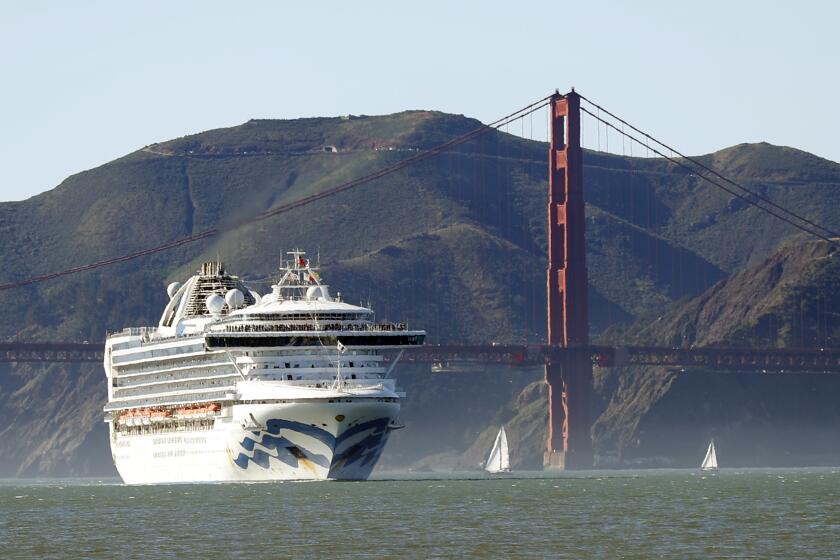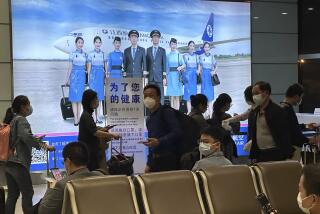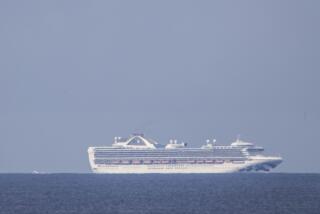U.S. has a coronavirus warning for its citizens: Don’t travel on cruise ships
The State Department on Sunday urged U.S. citizens to not travel on cruise ships, warning that passengers on the hulking vessels are more likely to contract the coronavirus infection and could be subject to quarantines and other international travel restrictions.
“U.S. citizens, particularly travelers with underlying health conditions, should not travel by cruise ship,” the State Department wrote in a statement on its website.
The U.S. announcement came as the number of U.S. coronavirus cases topped 500, with the largest numbers in Washington state, New York and California.
Up until Sunday, the White House has resisted cruise ship warnings because President Trump has not wanted to do or say anything that might further hurt the stock market and the travel industry. Over the last month, the stock price for Carnival Corp., owner of Princess Cruises, has declined nearly 35%.
The State Department alert came the day before the Grand Princess cruise ship was expected to dock at the Port of Oakland, where 3,000 people — about 1,000 of whom are from California — will disembark. All of those passengers will be quarantined for two weeks at military bases.
At least 21 people on board the ship have confirmed cases of COVID-19, which is caused by the coronavirus that originated late last year in China.
The virus also spread on another cruise ship, the Diamond Princess. Eight people died after contracting the illness on that ship, and more than 700 were infected.
Gov. Gavin Newsom on Sunday criticized the cruise industry, saying that its leaders needed to implement stricter safety protocols to prevent further spread of the virus. He noted that California sees heavy cruise ship traffic and cannot continue to handle large-scale quarantines of ship passengers.
“We simply as a state cannot experience this kind of operation at the scale that is likely” if cruise ships don’t take more precautions, Newsom said at a news conference.
The world’s largest association of cruise lines on Sunday announced it would adopt enhanced screening measures for passengers. Cruise Lines International Assn. said it would not allow anyone who has visited South Korea, Iran, China or affected areas of Italy to board its ships. All passengers will also be subject to temperature screenings, and those with readings above 100.4 degrees Fahrenheit may be asked to disembark.
“We remain in close contact with local governments around the world, and while we regret that these changes will result in the denial of boarding for some of our guests, travelers should know that their health and safety is the absolute priority for the industry,” said Kelly Craighead, president and CEO of the association.
The crowded and confined environment of cruise ships makes them especially prone to disease outbreaks, according to the Centers for Disease Control and Prevention. Outbreaks on ships can persist throughout multiple voyages if crew members are infected, and medical facilities on-board are limited when compared with the care mainland hospitals can provide.
The most frequently reported cruise ship outbreaks have involved respiratory or gastrointestinal infections and vaccine-preventable diseases like the flu.
Anywhere from eight to 16 outbreaks of norovirus — a highly contagious stomach bug — occurred each year among the international cruise ships that ported in the U.S. between 2010 and 2015, CDC data show.
If you don’t want to sail amid coronavirus worries, many cruise lines will give credits for a future trip without cancellation penalty fees.
The coronavirus death toll in the U.S. rose to 21 on Sunday, and at least 537 cases of infection have been confirmed nationwide, including 114 in California. Worldwide, more than 109,000 people have been infected and more than 3,800 have died.
The decline in cruise ship visits could dramatically impact the economies of countries like Mexico, which relies heavily on tourism.
The resort city of Cabo San Lucas, which hosted 204 cruise ships in 2019, has already taken a big financial blow because of coronavirus concerns. State authorities have reported a 20% to 30% drop in cruise ship reservations.
Questions have been raised about whether passengers on the Grand Princess could have either picked up or spread the coronavirus when it visited Cabo and three other Mexican Pacific ports during a trip from San Francisco in February.
Mexico has confirmed a total of six cases of the coronavirus, but none so far in the state of Baja California Sur, where Cabo is located.
Staff writers Anita Chabria, Susanne Rust and Patrick J. McDonnell contributed to this report.
More to Read
Sign up for Essential California
The most important California stories and recommendations in your inbox every morning.
You may occasionally receive promotional content from the Los Angeles Times.












